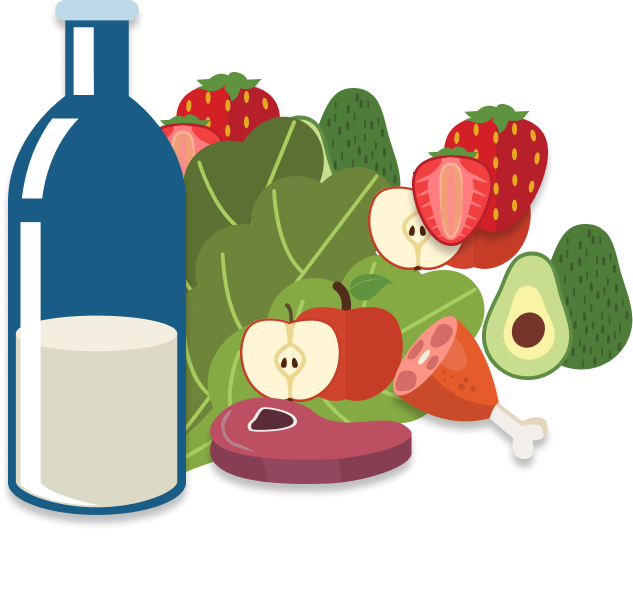You may also like…
NUTRITION, ANEMIA, NEURAL TUBE DEFECTS, HEALTHY WEIGHT GAIN, NUTRIENTS
˹saying,˺ “Eat from the good things We have provided for you, but do not transgress in them, or My wrath will befall you. And whoever My wrath befalls is certainly doomed. Surah taha verse 81
Already explained in the Nutrition article is the importance of a healthy diet, its effects on pregnancy and the baby. Eating a balanced diet with all the nutrients required fulfils the daily needed requirements for a pregnant lady and is by far the best thing a mom-to-be can do. In Pakistan, women are predisposed to developing deficiencies of certain nutrients which make them more vulnerable to developing certain conditions during pregnancy. That said, supplementing these nutrients can evade this problem and stop any harmful effects developing in the baby due to those deficiencies.
Why is a focus on nutrition important for a mother to be?
It has been shown through research that a mother’s nutrition can affect gene expression in the fetus. By gene expression we mean the pre coded DNA sequence that a child is born with. This gene expression determines a wide array of physical and genetic traits of the baby and are important indicators of the baby’s health throughout the life of a human being. Research suggests that dietary practices during the critical time period of an infant’s development in the womb have significant changes on the developing organs of the baby. It has been stated in research that undernutrition in the mother limits the growth of the baby in a way that the it develops cardiovascular disease as an adult. In the same way, over nutrition, obesity and unhealthy weight gain enables the baby to develop obesity, heart disease, type 2 diabetes, and asthma in adulthood. This said, it must be stressed that a good maternal diet which is rich in nutrients such as folate can have genetic effects which assume a protective role for the baby against diseases such as cancers and type 2 diabetes in adulthood.
Significance of anemia in pregnancy?
Anemia in pregnancy is a global health problem and affects nearly half of pregnant women worldwide. It is associated with increased rates of premature birth, low birth weight and perinatal mortality. Iron deficiency and folate deficiency are the most common causes of anemia during pregnancy.
Most women will benefit with the supplementation of 30 to 60 mg elemental iron daily. For folic acid, the recommended daily intake is 4 mg of folic acid started atleast one month before conception and continued through the first trimester.
What are neural tube defects?
Neural tube defects are early disorders of pregnancy where the brain and spine fail to develop properly; the most common are Spina Bifida(spine disorder) and anencephaly(brain disorder). Taking the daily 4mg folic acid supplement one month before and throughout the first trimester in the pregnancy can cure this ailment promptly.
How can "low birth weight" be a significant problem for the baby in later life?
Underweight women face the risk of increased preterm births and small for gestational age, low birthweight infants. A woman who is underweight can curb this problem by gaining sufficient weight gain during pregnancy following the dietary recommendations for pregnant women.
Calculate your BMI using the BMI calculator, estimate where you lie on the weight index and follow the dietary recommendations for women in order to gain healthy weight during pregnancy.
Why is being overweight and obese bad for you and your baby?
Obesity has a become a global epidemic and is no longer a disease associated with the higher socioeconomic class. Pregnant women who suffer from such a health condition are at risk of developing problems of not just pregnancy but also infancy and childbirth. Women who are obese are at a higher risk of developing gestational hypertension and gestational diabetes. In addition, women who are overweight are more prone to developing complications during labor and delivery. Such women also run the risk of delivering infants who are small for their gestational age, most probably because they haven’t absorbed the nutrients adequately. And while these babies are small for gestational age, their stage is set for developing childhood obesity because they have higher body fat deposits than other babies. Considering childbirth, overweight woman are at a risk of suffering from a difficult labor, birth trauma and infant injury.
Calculating your BMI prior to conception and then working your way into the weight index is a good start. Once you know exactly how further you are from your normal weight you can get an estimate of how much weight you need to lose. Follow a healthy weight loss guide and don’t starve yourself. Remember, weight loss out of habit and in starvation comes back just as quickly as it was lost. Incorporate a healthy physical routine and workout at least three times a week.
It has been researched that maternal zinc deficiency is linked with small for gestational age infants. Consuming foods with adequate zinc content could ultimately help mothers give birth to gestational babies who are the correct weight and size for their age.








